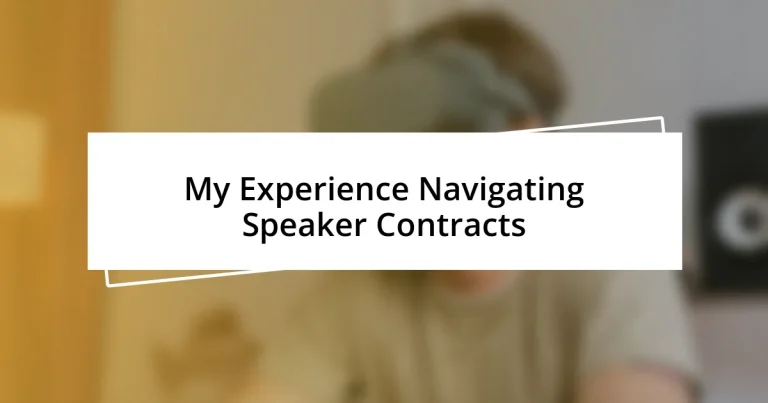Key takeaways:
- Speaker contracts are crucial for protecting time, intellectual property, and clarifying expectations between speakers and organizers.
- Key elements to include in speaker contracts are fees, event details, scope of work, travel arrangements, cancellation policies, and intellectual property rights.
- Negotiating speaker fees requires confidence in one’s value, openness to discussions, and clear articulation of past successes to justify fees.
- Regular communication, thorough preparation tailored to the audience, and post-engagement follow-ups enhance the overall speaking experience and build lasting relationships.
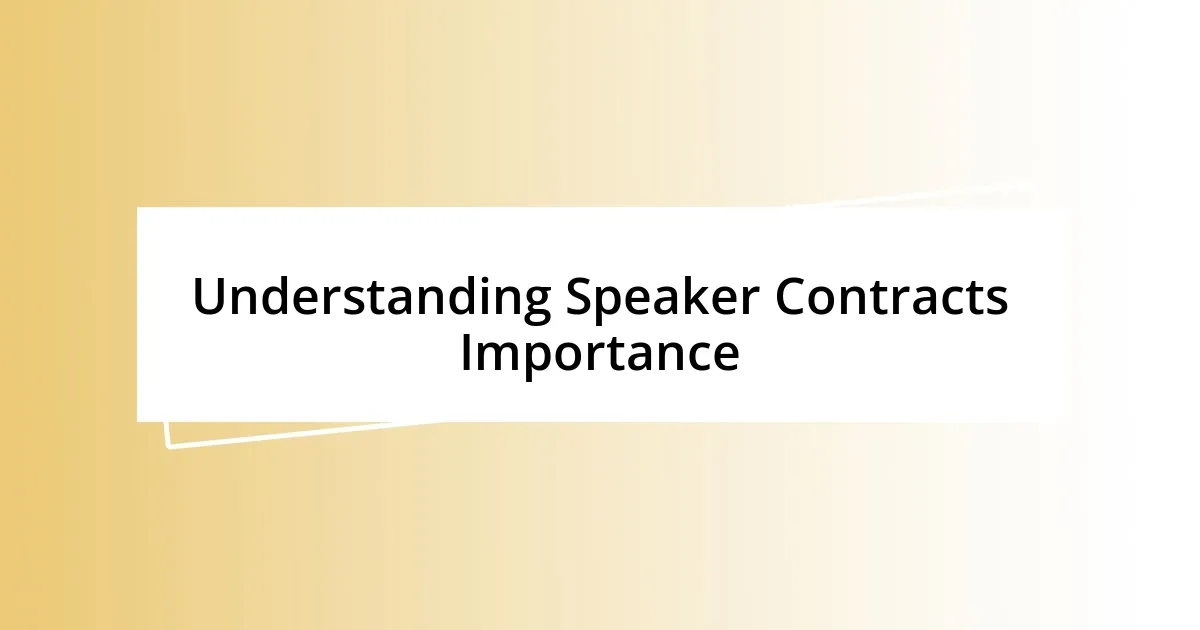
Understanding Speaker Contracts Importance
Understanding the importance of speaker contracts is essential for anyone stepping into the speaking arena. I vividly recall my early days when I naively accepted a speaking engagement without a contract. That experience left me feeling vulnerable and exposed, as it taught me just how crucial it is to have clear agreements in place to protect my time and intellectual property.
Contracts serve as a safeguard, outlining the expectations and responsibilities of both parties. Have you ever found yourself in a situation where details of an engagement slipped through the cracks? I certainly have, leading to confusion and disappointment. A well-drafted contract can prevent those pitfalls, giving both the speaker and the organizer a mutual understanding that builds trust and professionalism.
Moreover, understanding speaker contracts can empower us as speakers. I once faced a request for more content than initially agreed upon, but my contract clearly outlined my limits. Isn’t it reassuring to know you have something to fall back on during negotiations? This knowledge not only boosts our confidence but allows us to negotiate better terms and protect our worth in the speaking business.
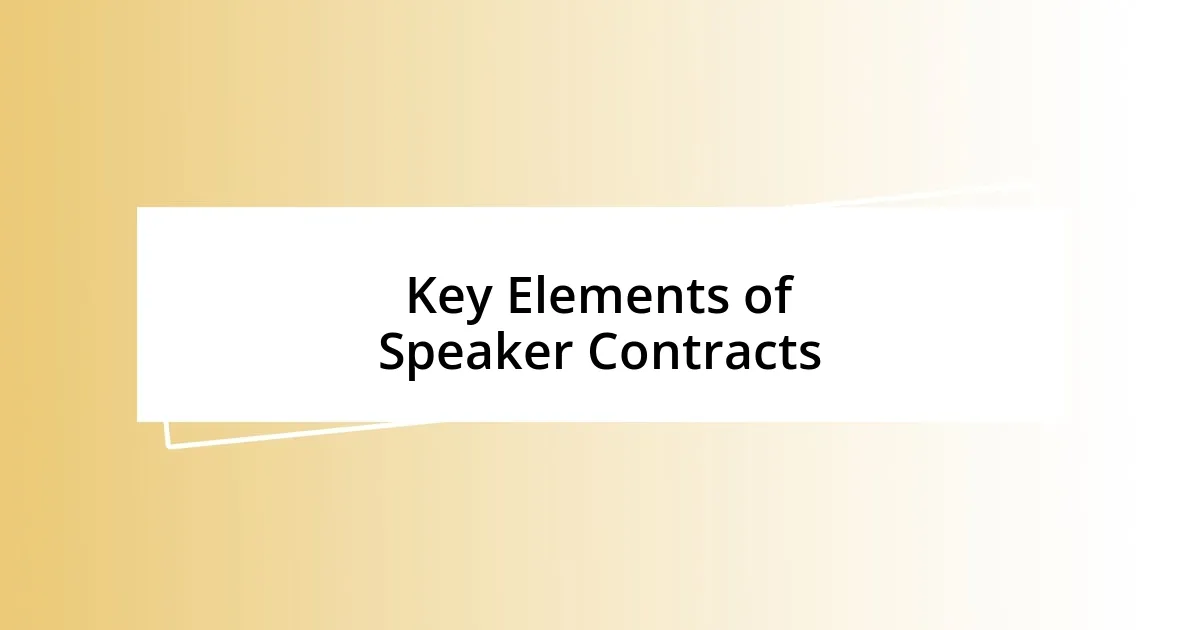
Key Elements of Speaker Contracts
When I think about key elements of speaker contracts, a few crucial components come to mind. These elements not only protect both parties but also establish clear expectations. It was eye-opening for me when I realized the importance of including every detail, no matter how small. I remember a contract I entered where the flight details were vague. Eventually, I found myself scrambling at the last minute. Here’s what I now consider essential in any speaker contract:
- Speaker Fees: Clearly stated amounts and payment timelines.
- Event Details: Date, time, and venue, including who provides equipment.
- Scope of Work: Topics to be covered and the expected duration of the presentation.
- Travel and Accommodation: Specifics about who arranges and pays for travel.
- Cancellation Policies: Terms for both the speaker and the organizer in case the event cannot go forward.
- Intellectual Property Rights: Clarification of ownership for the materials presented.
Not only do these elements mitigate risk, but they also lay the groundwork for a successful engagement. I remember how much more at ease I felt once I ensured that each of these aspects was nailed down. It’s like having a safety net that gives you the confidence to focus entirely on your presentation, rather than worrying about contractual nuances.
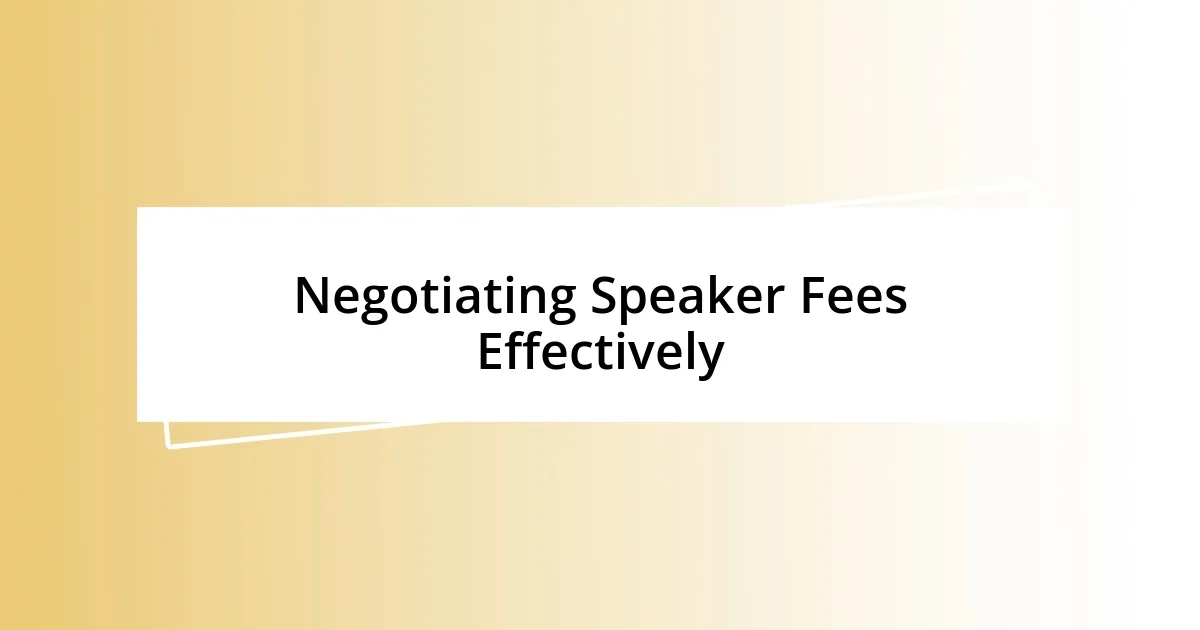
Negotiating Speaker Fees Effectively
Negotiating speaker fees can sometimes feel daunting, but from my experience, having a clear strategy makes all the difference. I recall a time when I initially undersold myself for a local conference. I hesitated, fearing I might lose the opportunity, but in hindsight, I realized that confidence is key. I learned that it’s vital to assess your worth by evaluating your expertise, audience reach, and the value you bring to the event. Set a starting price that reflects this value, rather than what you think others will pay.
Once you’ve established your fee, it’s essential to remain open to discussions. I remember a negotiation where the organizers proposed a lower fee but offered added value in terms of marketing and resources. Initially, I felt deterred, but when I analyzed the potential exposure and future speaking opportunities, it became clear that this could be beneficial. Being flexible and understanding the complete picture is where great deals often emerge.
Lastly, always articulate your value clearly during negotiations. I particularly cherish a moment when I presented a clear outline of how my talk has previously engaged audiences and led to actionable outcomes. Sharing metrics or previous successes can resonate well with organizers and justify your fee. It’s not just about the dollar amount; it’s about the lasting impact you create. When I adopted this approach, I noticed a significant improvement in how my fees were received, leading to more fulfilling engagements.
| Pricing Strategy | Outcome |
|---|---|
| Initial Low Fee | Undervalued experience, potential lack of opportunities |
| Value Reflection | Justified fee with potential for growth and engagement |
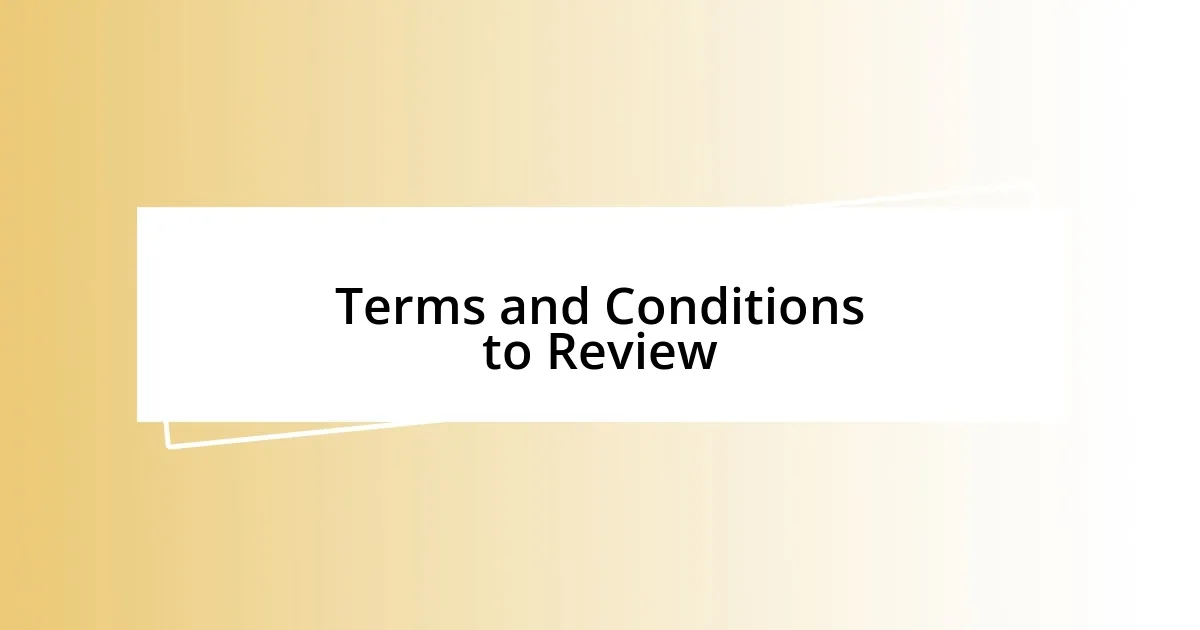
Terms and Conditions to Review
When reviewing the terms and conditions of a speaker contract, I’ll never forget the time I overlooked the cancellation clause. I assumed it would be a standard policy, but when an unforeseen circumstance arose, I realized the terms weren’t in my favor. It serves as a reminder that every detail matters; asking questions to clarify terms can prevent hiccups later on.
Another fundamental aspect is the intellectual property rights. I once delivered a workshop that incorporated my proprietary materials, but the contract didn’t specify ownership. This lapse led to quite a headache when I discovered that my content was being used without my permission. I can’t stress enough how vital it is to clearly outline who retains rights to the presented material. It protects your hard work and keeps your peace of mind intact.
I also find it essential to pay attention to the payment terms. Early in my speaking career, I was anxious about getting a positive response and agreed to receive payment after the event. However, I soon learned the importance of negotiating upfront payments or deposits. That reassurance can significantly ease the stress of waiting for compensation, especially when expenses accrue beforehand. Learning to demand clarity not only fosters professionalism but also establishes mutual respect in the speaker-organizer relationship.
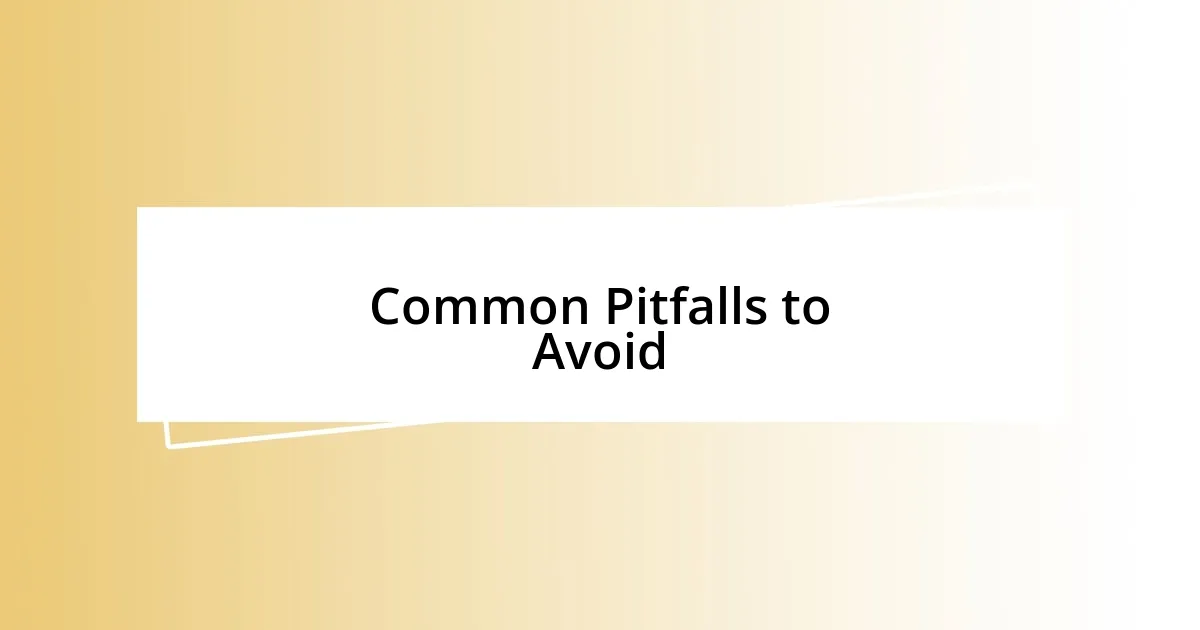
Common Pitfalls to Avoid
One of the biggest pitfalls I’ve encountered is not setting clear boundaries regarding your time and availability. I remember the excitement of my first speaking engagement. I said yes to every single request the organizers had, from additional meetings to social media promotions. It felt good to be wanted, but I quickly found myself stretched thin and overwhelmed. Have you ever overcommitted yourself? It’s crucial to establish how much time you’re willing to dedicate upfront to avoid burnout and maintain the quality of your engagement.
Another common misstep I often see—and have fallen into myself—is ignoring the importance of a detailed contract. I once received a verbal agreement for a speaking engagement, which felt secure at the time. However, once I delved deeper into preparations, I found that several important elements, such as travel expenses and accommodations, were never formally discussed. That surprise caught me off guard and led to some tense exchanges. Don’t underestimate the power of a well-defined contract; it’s your safety net to navigate any potential misunderstandings.
Lastly, there’s the trap of comparing yourself to others in the field. I’ve caught myself scrolling through social media, looking at my peers’ achievements and questioning my own worth. At one point, I adjusted my fees based purely on what I saw others charging, which didn’t resonate with my unique value. Remember, the wrong comparison can lead to undervaluing your work or pricing it incorrectly. Have confidence in your specific strengths and experiences; they are what sets you apart.
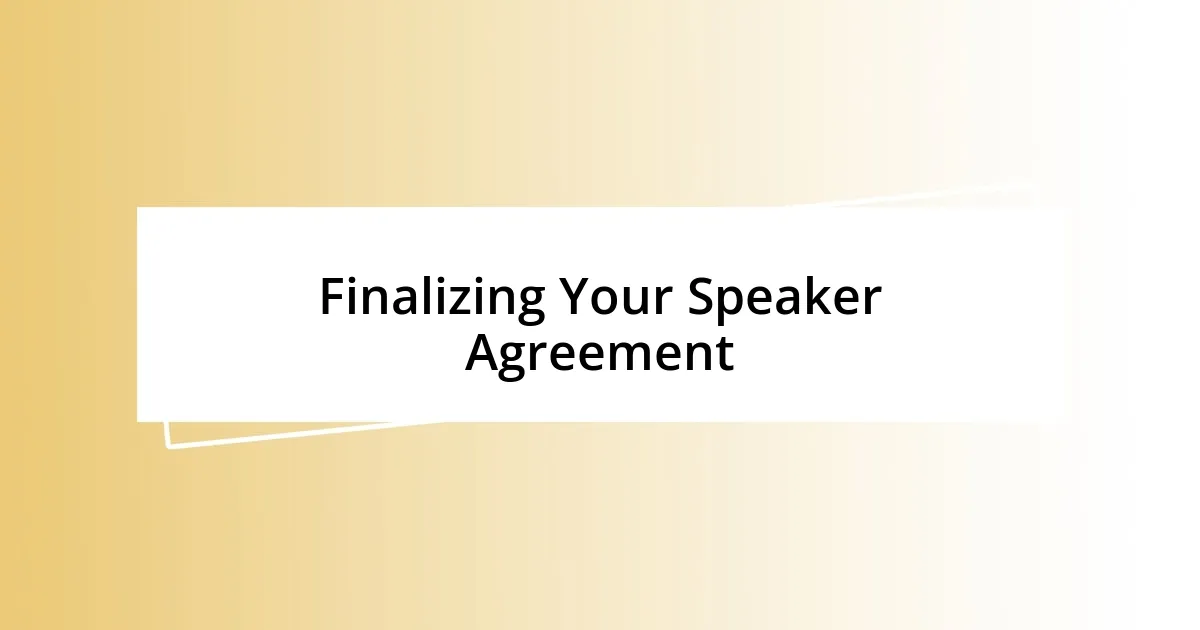
Finalizing Your Speaker Agreement
When finalizing your speaker agreement, I’ve learned to meticulously review every detail before signing on the dotted line. Some years back, during a particularly busy month, I hastily agreed to an engagement without thoroughly checking the schedule. I ended up discovering a conflict with a prior commitment, which resulted in scrambling to resolve both, and let me tell you, the stress was palpable! Have you ever juggled multiple commitments without realizing the chaos it might create? It’s moments like these that remind me how crucial it is to align all dates and obligations before moving forward.
Budgeting for the unexpected is also vital in this stage. I once found myself in a tricky situation when I failed to account for additional travel costs after accepting a gig that required me to fly across the country. The agreement didn’t specify what expenses would be covered, and I was left scrambling to adjust my budget at the last minute. It made me realize that you can’t afford to overlook potential hidden costs. Have you experienced a surprise expense that shakes your financial planning? Always ensure your agreement clarifies who is responsible for what—it’ll save you from unnecessary headaches later.
Finally, take the time to establish a good rapport with your point of contact. I remember when I initially focused solely on the formal terms, neglecting the human side of the relationship. However, I noticed a considerable difference in collaboration and communication when I started fostering personal connections, like checking in to see how the planning was progressing. Is there someone on the organizing side whose role you can better understand? Building those relationships creates a smoother path for any adjustments or concerns that may arise. Being approachable and open not only enhances the overall experience but also sets a positive tone for the entire engagement.
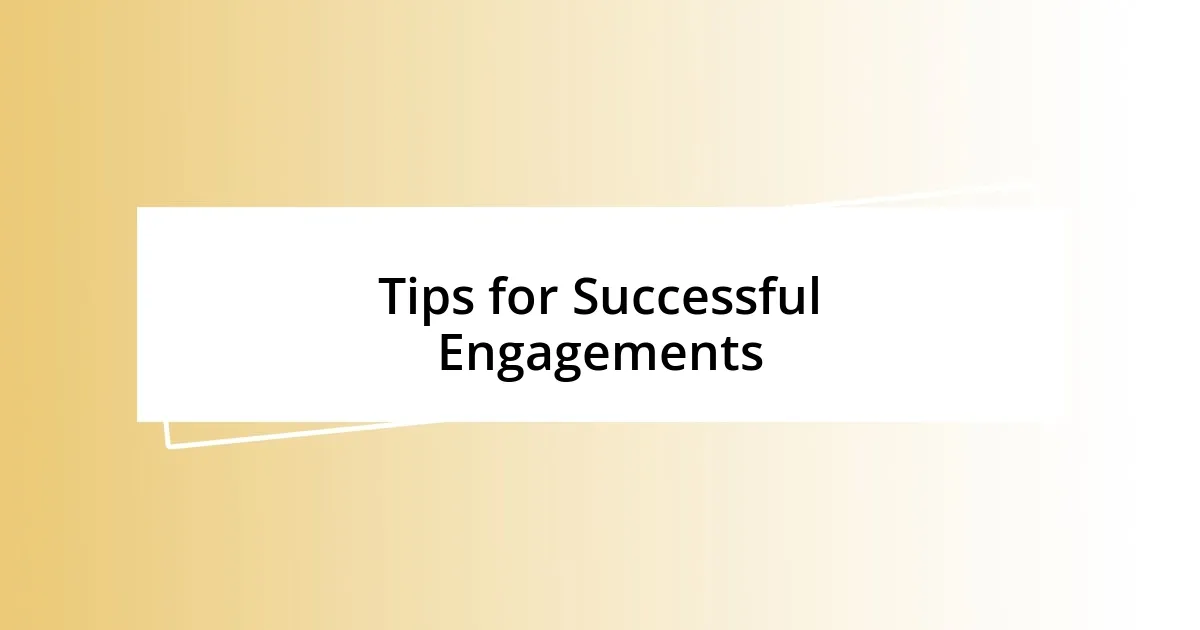
Tips for Successful Engagements
One important tip I’ve found for successful engagements is to communicate openly with the event organizers. There was a time when I hesitated to share my needs, thinking I might seem demanding. I remember feeling anxious about asking for specific AV requirements during one event. When I finally did, the organizers were incredibly supportive and accommodating. This experience taught me that expressing my needs can lead to a more enjoyable and effective engagement for everyone involved. Have you ever held back from voicing your preferences? I’ve learned that clear communication fosters better collaboration.
Additionally, preparing thoroughly for your audience is key. I recall a speaking engagement where I assumed the audience would have a basic understanding of the topic I was covering. My heart sank when I realized they were much less familiar than I had expected. This not only made my presentation feel off but also left me feeling disconnected from the audience. Engaging with the organizers about the audience’s background can help tailor your content effectively. It’s a small step that can lead to significant improvements in how your message resonates.
Lastly, I can’t emphasize enough the importance of post-engagement follow-ups. After one particular engagement, I sent out thank-you notes and asked for feedback. The responses were eye-opening! Not only did it strengthen my relationship with the organizers, but I also received constructive insights that helped me improve. This simple act turned a one-time interaction into a lasting connection. Have you considered how a follow-up could open new doors? Each engagement can become a stepping stone for future opportunities, and nurturing those relationships is where the magic happens.












